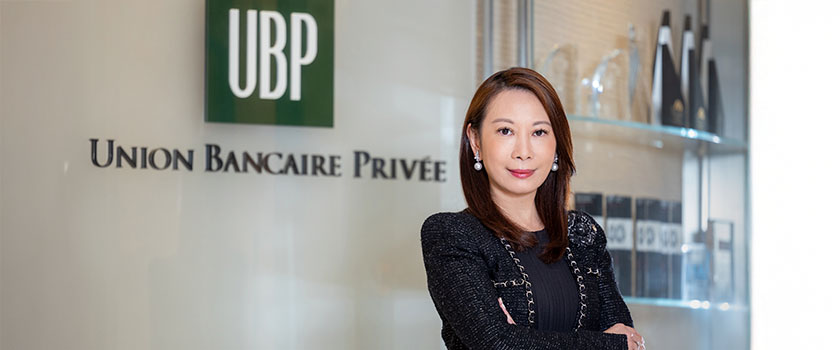Hubbis - (04.07.2023) - After more than four years as Co-Head for North Asia at HSBC Private Bank, and a long and diverse career in major global financial institutions, veteran private banker Ivan Wong took the reins as CEO for the Hong Kong operation of UBP in November last year.
With over six months under his belt already at UBP, Hubbis met up with the eloquent and insightful Ivan to hear more about his missions and motivations at UBP, to learn of his perceptions of private banking after more than three decades in finance, and to hear more about why he feels energised and excited by the challenge of helping build the UBP business in North Asia. He explains that China and the North Asia region represent immense opportunities for growth in international wealth management and that UBP is gradually and carefully building a targeted domestic presence, armed with the strategic and long-term perspective as well as the patience that one of the world’s largest family-owned private banks can afford. He is positive not only about the region, but the position of Hong Kong, which he says has a particularly strong value and business culture for North Asian clients, and where the government and regulators are working hard to enhance its regional and global connectivity and competitiveness.
Not long before Ivan joined UBP, Hubbis had spoken to Michael Blake, the similarly eloquent CEO of the Asian wealth management operations of UBP, who has presided over a phase of dramatic growth for the business in Asia, where assets under management more than doubled in the 5 years since 2016 to be a meaningful component of the UBP group’s total AUM of just over USD140 billion.
By way of background, Ivan reminds us that UBP was founded in 1969 by Edgar de Picciotto, whose vision from the outset was to offer investors a high-quality and innovative wealth and asset management service. In its fifty-plus-year history, the bank has maintained its independence and remains on the expansion trail. In recent years, UBP has acquired the international private banking divisions of Royal Bank of Scotland (Coutts) and Lloyds, the Swiss subsidiary of the ABN AMRO group, ACPI Investments in London, Banque Carnegie Luxembourg, and most recently Millennium Banque Privée in Switzerland and Danske Bank International in Luxembourg.
Taking the long view
As UBP is not listed and has remained family-owned since its founding, Ivan notes that an appeal in joining UBP is that the bank is able to take a longer-term view than perhaps a public company would consider, given the pressures of quarterly reporting. “This is a culture in which I can really add value and a culture that I believe in,” he reports. “As to character and approach, our CEO for Asia, Michael Blake has often said that we are a ‘bankers’ bank’ and that the bank will retain its focus on upper HNW and UHNW clients and keep building a highly personalised offering supported by technology.”
Ivan also says he was attracted by the stability of the institution. As of 31 December 2022, the group maintained CHF2.6 billion in shareholders’ equity, a Tier One capital of 26.7% and a long-term rating of Aa2 from Moody’s. The bank today operates from more than 20 locations worldwide, with its Asia operations including the major Hong Kong and Singapore hubs, as well as offices in Tokyo, Taipei, Shanghai and Haikou, where the bank last year obtained a private fund management licence.
Seizing Asia’s growth potential
In previous interviews with Hubbis, Michael Blake explained that UHNW is the core focus and the fastest-growing client segment of UBP’s business across Asia. The bank’s wealth management proposition is today spearheaded jointly with the asset management operation and starts with a customised investment strategy that reflects the needs of the client, anchored around three niche capabilities: bespoke mandates, credit solutions and alternatives, including private markets.
Ivan also points to UBP’s wealth planning and family office expertise in the region, with a team of seasoned wealth planners in Hong Kong and Singapore, supported by family office specialists in Switzerland. They provide advice to wealthy families seeking customised investment strategies, efficient operational structures and access to UBP’s family office partner network.
Riding UBP’s momentum in Asia
He also notes that he was attracted by UBP’s broad and long-standing commitment to Asia, and the public statements the top leadership have made about North Asia as an area of major investment and dynamic expansion for the bank, with Mainland China a jewel in the region’s crown.
Indeed, in the last interview with Michael Blake in 2022, he told Hubbis: “This time [2022] is the right time for us to start thinking seriously about how to secure more exposure to Mainland Chinese wealth, which represents perhaps 60% of the wealth pool today in Asia. Two-thirds of our growth over the past five years has come from Greater China and we expect that trend to continue. Hiring of Greater China senior private bankers will be key, but so too will a targeted presence on the mainland. China’s wealth management industry is coming of age and there is a golden window of opportunity for international wealth managers to participate.”
A natural fit
Ivan recounts that he was naturally excited to step up to the plate, leaving the comforts of his previous corporate role for the more entrepreneurial culture of UBP, and aiming to seize some of the many growth opportunities ahead in China and more broadly North Asia.
“Hong Kong is the hub for our North Asia business, and Greater China is the main game within the region,” Ivan reports. “We are well placed and our financial stability places us in an even greater position of strength given the events of 2022 in Europe and the US. As a family-owned business, we value conservatism and risk management, and these characteristics are in strong demand here, even more so today.”
In times of uncertainty…
Ivan explains that the volatility and uncertainty of the past 18 months in major markets, allied to the several years of China being out of favour, have added even more import to UBP’s claims to be highly focused on risk management for client assets.
“As an institution, we have long advocated the importance of long-term and sustainable investments, and this message is today even better received in this region, amidst all the ongoing uncertainties,” he reports. “We strive to become and then remain the trusted advisor to clients. And talent, professionalism and consistency are all part of the delivery of that value and the execution of that trust.”
Adding the building blocks
Ivan arrived in his current position as momentum was building around UBP’s efforts in the region. The new UBP Private Fund Management (Hainan) Co., Ltd. was established in February 2022, and only four months later in June, the Hainan office secured a qualified domestic limited partnership (QDLP) quota, enabling it to offer international investment strategies to qualified domestic investors. That made UBP the first Swiss wealth manager to secure a QDLP licence in Hainan, and it became the second QDLP licence and office for UBP in China. It was a major step for UBP, which opened its first office in Shanghai back in 2014.
Then in December last year, UBP’s Hainan office, working collaboratively with Hurun Research Institute, a renowned institute on research into wealth creation in China, published a comprehensive report on the Chinese family office scene, aiming to define the history and value of a family office in China, their evolution over time, their characteristics and their future.
China’s vast potential
Ivan takes his wide-angle lens to look more broadly at China, explaining that the vast wealth management opportunity for UBP exists both onshore and offshore.
“Many different banks have been trying different types of strategies, and there is no single answer as yet,” he comments.
“UBP has been taking a step-by-step approach in playing to our strengths, and the relatively recent QDLP licence in Hainan, through our fully-owned asset management subsidiary, will help advance us further into the mainland. But it will be gradual, as the market there is so vast and complex for international players to penetrate.”
Ivan explains that the family office research project with Hurun was another step towards enhancing UBP’s brand and profile onshore. “Hurun is like the Forbes of China, and publishes the who’s who of wealthiest Chinese, for example, so the report we have worked on with them is a means to enhance our profile and credibility,” he reports.
A more professional approach to wealth
He also offers more insight into the family office ecosystem in China, noting that such operations are generally some way off the typical well-established family office in Europe or in the States, but also far ahead of how things were ten years ago. The demands on investors have risen significantly in recent years, as China’s markets have struggled and then as major global markets turned down in early 2022, led by the US indices.
Ivan comments: “The reality is that a more disciplined and analytical approach to portfolio management is now needed, and that is helping to drive the advance in wealth management practices in China and hence the evolution of the family office environment there; those entities might be still in their early days, but they are clearly evolving very quickly.”
Key Priorities for UBP in North Asia
Ivan reports that as CEO of the Hong Kong hub, he has several missions ahead. “I would first point out that we are a patient, family-owned organisation that takes a realistic perspective on our ambitions in China,” he explains. “We do not set ourselves unrealistic goals and are also cognisant of overall market conditions, which for the past couple of years have not been conducive to growth. We measure success in ways other than just growth in AUM.”
Having said that, he explains that growth is a core priority and to achieve that, there is a need to continue to hire bankers who have the experience and track record to make a difference. “We are having success in that regard,” he reports. “We have attracted around ten senior bankers since I joined, some of them soon to be onboarded, and including some heavy hitters such as Andrew Chin who used to run the UHNW business for HSBC in Hong Kong, one of the leading teams in the region.” He adds that there is an ongoing effort to optimise their capabilities to be ready for the potential growth story ahead.
Ivan drills down further into the challenges around attracting and retaining the right RMs and advisors, noting that the UBP approach is agile and steers clear of being prescriptive.
“We do not have a list of boxes that must be ticked,” he says. “We describe UBP as the bankers’ bank and we tend to attract the more senior bankers who handle UHNW and upper HNW clients. They understand that their own business looking after clients with USD20 million or more to invest is founded on client centricity, and we want that type of banker, whose clients are loyal to them. Different characters suit different clients, so we are looking for that differentiation, that diversity, and then we fully support them in delivering to their clients.”
At the same time, UBP is also upgrading its overall investment proposition, aligning investment ideas and advice emanating from Singapore with its hub markets in ASEAN and similarly targeting such ideas and advice coming out of Hong Kong with its North Asia markets and clientele. To that end, UBP recently announced that it is hiring a new head of investment services for North Asia.
Another mission is to align the wealth and asset management business more synergistically and thereby make the best use of the firm’s talent pool and expertise. “By combining these two teams to become one integrated team the aim is to synergise the bankers and the investment professionals to provide better services to our clients, and at the same time make the best use of our collective resources,” Ivan reports.
Hong Kong – building a future from its history
Ivan draws the conversation towards a close by turning his gaze to Hong Kong and its position in the region’s wealth management universe. He says he remains optimistic about Hong Kong’s future, based on its location, history, extensive and proven capabilities, culture and language, as well as the government’s support for the finance industry and wealth management, and the sophisticated and forward-looking approach to regulation.
He highlights the Hong Kong government’s efforts around their ‘super connectors’, linking China to the rest of the world and connecting the rest of the world to China.
“Linking that back to the private wealth management business, many clients in this part of the world actually still prefer the bankers to be located here, even though that does not mean the booking needs to be here,” Ivan observes.
“People in this part of the world still believe the bankers located here understand them and their needs, can offer the right products and solutions, and as a result, the Hong Kong managed global book arrangement still has value in the foreseeable future.”
Ivan’s enthusiasm and optimism about the current course of activity and the outlook for the bank’s operations in North Asia are evident throughout the discussion.
He closes the conversation by remarking: “I will confess to being somewhat of a workaholic, still enjoying long hours including at weekends helping to build the bank’s business. I am genuinely enjoying the dynamism, and also the results emerging from these collective efforts. Money does not drive me on. It is the challenge, the people, the clients and the diversity of the different missions and the teams within the operation. For me, running this operation within a privately-held wealth manager is another level of challenge, another level of excitement.”
Getting Personal
Ivan is a Hong Kong boy through and through, born and educated there all the way through to obtaining his qualifications in mathematics and computer studies at the University of Hong Kong, and then his MBA from the Chinese University of Hong Kong.
“It looked like I was heading for a career in computing and IT, and that was the mid-1980s when IBM looked like it was the master of that universe, and I was fortunate enough to have worked as an intern there,” he recalls. “That was during my MBA days and while it was a great experience, it became clear that this path was not for me, as I realised then I was not an IT guy. I understood that I wanted to pursue a different path, although it was not yet clear what.”
That led him to a student exchange programme with the US business school NYU Stern, part of New York University. “That was when I learned about international finance, and we visited dealing rooms on Wall Street at the time. The hubbub and excitement were incredible. I knew what I wanted to do, and I later joined Citibank in Hong Kong, after completing the MBA. It was a great start in what has been a diverse and fascinating career.”
He began his working life as a trader at Citibank, and while he enjoyed that phase, he also felt there were opportunities beyond the trading floor. He was recruited into Chase Manhattan Bank, before the merger with JP Morgan, and transitioned to corporate banking and finance.
That later led to a return to Citibank when he was around 30 years old, joining their derivatives sales and structuring group, working with a wide array of clients and also in ASEAN countries, and by the time of the Asian financial crisis of 1997, heading the Citi derivatives business for Southeast Asia.
It was not long before he was headhunted into HSBC, and from 2002 Ivan headed the HSBC derivatives business for Asia. Later on at HSBC, he received some valuable advice from his boss at the time, who suggested he expand his CV, and that was when the door to private banking opened in 2015, and he was soon running the investment business for HSBC’s private banking operation in the region, and later overseeing the private banking business for North Asia. In November 2022, he joined UBP in his current role.

Ivan Wong
Region Head North Asia and Chief Executive Hong Kong








